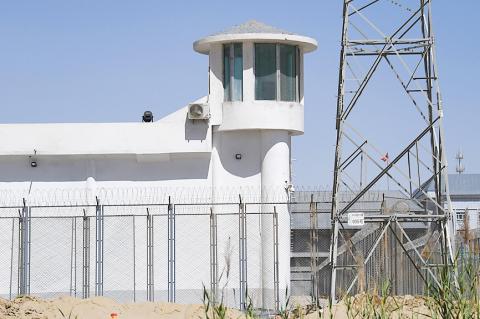Gloves made in China for the popular French brand Lacoste appear to have been sewn at a factory where Uighur Muslims face forced ideological and behavioral re-education, a US-based labor rights group said.
Lacoste, known for its iconic green crocodile logo, says it halted shipments after learning of labor abuse in its supply chain from Washington-based labor group Worker Rights Consortium.
The group alleges that Uighurs and other ethnic minorities are being forced to sew the Lacoste-branded gloves.

Photo: AFP
A Lacoste spokeswoman said that the Chinese factory had been visited by auditors, who interviewed workers and did not report any concerns.
“Lacoste prohibits the use of forced, mandatory or unpaid labor of any type,” company spokeswoman Nathalie Beguinot said.
She said that 95 pairs of gloves from the factory in question were sold in Europe and that unsold gloves made at Yili Zhuo Wan Garment Manufacturing Co (伊犁卓萬服飾製造公司) have been warehoused.
Worker Rights Consortium executive director Scott Nova said that Lacoste and other buyers should have known better than to trust auditors who interview workers on site, where they cannot speak freely.
“Given the climate of terror the government has created in the Xinjiang Uighur Autonomous Region, given its intensive efforts to conceal proof of forced labor from foreign eyes, and given the pervasive surveillance apparatus that makes a confidential conversation oxymoronic, no worker is going to tell a factory auditor that her employer and the government are breaking the law by forcing her to work against her will,” Nova said.
Yili Zhuo Wan officials could not be reached for comment.
Last year, nonprofit group reports described forced labor and indoctrination of hundreds of people inside the factory.
The people were swept up as part of a massive Chinese government crackdown that by some estimates has locked away more than 1 million minorities, most of them Muslims, over the past three years, the reports said.
The Chinese government denies this. It has said that the detention centers are for voluntary job training and that it does not discriminate based on religion.
The Washington-based Center for Strategic and International Studies (CSIS) last year interviewed two former Yili Zhuo Wan workers, who said they were forced to study Mandarin and praise the government.
One, a trained seamstress, said that she was paid about US$37 for her first month and a half of work.
Amy Lehr, who coauthored a CSIS report that included claims of forced labor in Xinjiang said: “This is basically state-encouraged forced labor and part of a much broader pattern of extremely severe human rights violation. It’s an attempt to eradicate a culture and religion.”
It is illegal to import products of forced labor into the US.
Lacoste says the gloves went only to France.
US Representative James McGovern, the Congressional-Executive Commission on China chairman, said that he would like to stop the import of all forced labor-made goods.
“No one should profit from the horrific human rights crimes being committed in Xinjiang,” McGovern said.

The CIA has a message for Chinese government officials worried about their place in Chinese President Xi Jinping’s (習近平) government: Come work with us. The agency released two Mandarin-language videos on social media on Thursday inviting disgruntled officials to contact the CIA. The recruitment videos posted on YouTube and X racked up more than 5 million views combined in their first day. The outreach comes as CIA Director John Ratcliffe has vowed to boost the agency’s use of intelligence from human sources and its focus on China, which has recently targeted US officials with its own espionage operations. The videos are “aimed at

STEADFAST FRIEND: The bills encourage increased Taiwan-US engagement and address China’s distortion of UN Resolution 2758 to isolate Taiwan internationally The Presidential Office yesterday thanked the US House of Representatives for unanimously passing two Taiwan-related bills highlighting its solid support for Taiwan’s democracy and global participation, and for deepening bilateral relations. One of the bills, the Taiwan Assurance Implementation Act, requires the US Department of State to periodically review its guidelines for engagement with Taiwan, and report to the US Congress on the guidelines and plans to lift self-imposed limitations on US-Taiwan engagement. The other bill is the Taiwan International Solidarity Act, which clarifies that UN Resolution 2758 does not address the issue of the representation of Taiwan or its people in

US Indo-Pacific Commander Admiral Samuel Paparo on Friday expressed concern over the rate at which China is diversifying its military exercises, the Financial Times (FT) reported on Saturday. “The rates of change on the depth and breadth of their exercises is the one non-linear effect that I’ve seen in the last year that wakes me up at night or keeps me up at night,” Paparo was quoted by FT as saying while attending the annual Sedona Forum at the McCain Institute in Arizona. Paparo also expressed concern over the speed with which China was expanding its military. While the US

SHIFT: Taiwan’s better-than-expected first-quarter GDP and signs of weakness in the US have driven global capital back to emerging markets, the central bank head said The central bank yesterday blamed market speculation for the steep rise in the local currency, and urged exporters and financial institutions to stay calm and stop panic sell-offs to avoid hurting their own profitability. The nation’s top monetary policymaker said that it would step in, if necessary, to maintain order and stability in the foreign exchange market. The remarks came as the NT dollar yesterday closed up NT$0.919 to NT$30.145 against the US dollar in Taipei trading, after rising as high as NT$29.59 in intraday trading. The local currency has surged 5.85 percent against the greenback over the past two sessions, central